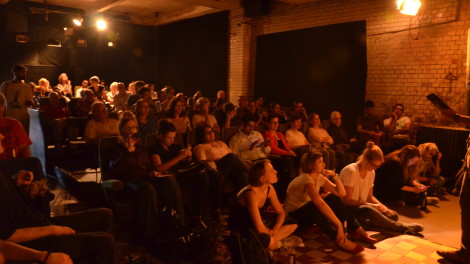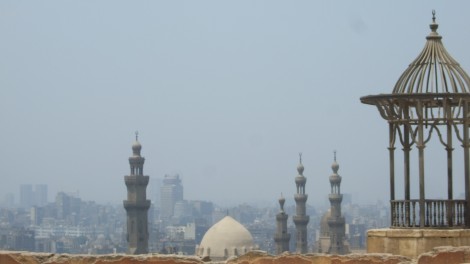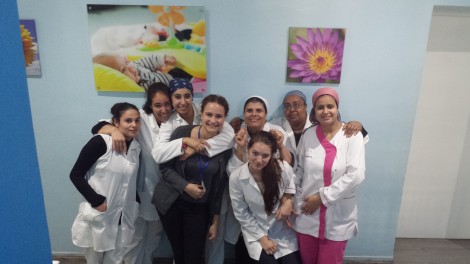Yearly Archives: 2016
JOIN OUR 2016 ’14km Film and Discussion Series’ TEAM!
YOU CAN JOIN THE 2016 '14km Film and Discussion Series' TEAM! - You are interested in North Africa and the Middle East? - You like to volunteer in a young team? - You enjoy to bring people with different cultural backgrounds together? - You are interested in film and documentaries? - You are good in organising? - You can help with project administration, public relations or simply support events? - You like to prepare social, political or cultural topics for our open audience discussions, moderate them, and invite speakers for this purpose? If you answered one or more questions positively, or if you are simply interested, please join our project startup meeting on Monday, 29 February 2016, at 7 pm (19:00), at Caffeteria Buchhhandlung 32, Tucholskystr.32, 10117 Berlin Mitte. 14km.org stands up for exchange and understanding between both neighbouring regions north and south of the Mediterranian Sea, in order to reduce the symbolic distance the Strait of Gibraltar (14km) sets. Since 2013 film and discussion events had been organised about current topics in North Africa or the Middle East. 14km Film and Discussion Series Feel free to contact us: film@14km.org Facebook Event
Cairo in motion
Mid-term report by Johanna with New Horizon
Johanna reports from her internship with New Horizon Association for Social Development in Cairo: I’ve been in Cairo for almost three weeks now and time went by very fast. Even though I’m out a lot, I still feel like I’ve hardly seen anything of the city yet. Cairo is just so big and everything is loud, colorful and confusing! One of the things I like most is to be in the Taxi in the mornings, passing the Nile on my way to work. Or sitting in one of all the small Coffee shops, having tea and watching the people passing by. Somehow I even like the smell of the city, a mixture of garbage, mud and car emissions. But finding a balance between what people tell me to do and what I personally feel is still very difficult and confusing for me. I feel very safe when I’m in the city, but I always loose this feeling when people constantly tell me how I should behave. I’m very curious to see if I will be able to find a proper balance during the next three months.
“Ich bin so dankbar für diese Erfahrung”
Praktikumsbericht von Dayala bei CSM in Rabat
Bei der Arbeit mit den Mitarbeiterinnen Meine Zeit in Marokko ist wie im Fluge vergangen und ich wünschte, ich hätte noch länger bleiben können. Insgesamt war ich im Oktober und November 2015 sieben Wochen in Rabat, wo ich ein Praktikum/ Freiwilligendienst bei der NGO Chantiers Sociaux Marocains (CSM) gemacht habe. Wie ich schon in meinem Zwischenbericht nach der Hälfte der Zeit berichtet habe, habe ich im Centre Lalla Meriem gearbeitet, einer Pflegeeinrichtung für Kinder und Jugendliche mit und ohne Behinderungen, mit welchem CSM kooperiert. Von Anfang an war ich total begeistert von Rabat. Obwohl es die Hauptstadt Marokkos ist, ist die Stadt nicht besonders touristisch. Dabei ist sie so sehenswert! In der Medina (Altstadt) ist stets ein turbulentes Treiben, hier kann man die bestens Schnäppchen ergattern, in verwinkelten Gassen das authentischste marokkanische Essen finden (das hier zudem sehr preiswert ist) und seine Freunde innerhalb von ein paar Sekunden inmitten der Menschenmasse verlieren. Abgesehen von einer „Touri-Straße“, in der es die typischen marrokanischen Souvenirs zu kaufen gibt, trifft man hier wirklich keine Touristen. Mit einem Teil meiner Gastfamilie Gewohnt habe ich während meines Praktikums bei einer Gastfamilie in der Nachbarschaft Youssoufia, die etwas außerhalb liegt. Meine Gastfamilie war sehr nett und gastfreundlich. Meine Gastmutter hat die beste Tajine gekocht! Das marokkanische Essen ist wirklich super. Mein Zimmer habe ich mir mit einer anderen Freiwilligen aus Deutschland geteilt, mir der ich auch zusammen im Centre Lalla Meriem gearbeitet habe. Zur Arbeit sind wir immer in einem geteilten Taxi gefahren, so hat die Fahrt nur 5 Dirham (~50 Cent) pro Person gekostet. Unsere Arbeit war mitten im Zentrum im Stadtteil Hassan. Auf dem Weg von Youssoufia in die Innenstadt sind wir jeden Tag an der Stadtruine Chellah vorbei gefahren, eine der Hauptsehenswürdigkeiten von Rabat. Gegen Ende meines Aufenthalts habe ich es endlich geschafft, mir Chellah anzugucken. Chellah ist wirklich traumhaft, wie ein großer Park, zwischen den ganzen Ruinen wachsen bunte Blumen und Palmen und von überall hört man das Klappern der Störche, die hier überwintern. Ich habe noch nie so viele Störche auf einmal gesehen, auf fast jeder Ruine hatten Störche ihre großen Nester gebaut. In Chellah Die zweite Hälfte meines Aufenthaltes ging noch schneller vorbei als die erste. Es ist ein tolles Gefühl, wenn man merkt, dass man an einem Ort richtig angekommen ist – dass man kein Tourist (mehr) ist, sondern sich in der Stadt auskennt, einen richtigen Alltag hat, Fortschritte in der Sprache macht und Freunde gefunden hat. Auch auf der Arbeit konnte ich besser mithelfen, da ich die Abläufe, Mitarbeiterinnen und Kinder gut kennengelernt hatte. Ich habe die meiste Zeit auf der Station mit den Kleinsten gearbeitet (Neugeborene bis ca. 2 Jahre) und die Kinder sind mir sehr ans Herz gewachsen. Die Babys, die gesund sind, werden alle adoptiert. Natürlich freut man sich immer sehr, wenn ein Kind wieder eine Familie bekommt, aber der Abschied fällt allen trotzdem immer schwer. Es ist schwierig ein Kind gehen zu lassen, wenn man es jeden Tag sieht und sich kümmert und vor allem weiß, dass man es wahrscheinlich nie wieder sehen wird. Ich bewundere die Mitarbeiterinnen im Centre echt für ihre Stärke. Babies, die eine Krankheit oder Behinderung haben, werden meistens nicht adoptiert und verbringen ihr ganzes Leben in der Einrichtung. Ich habe während meiner Arbeit im Centre Lalle Meriem sehr viel gelernt und an Erfahrung mitgenommen. Mit den Mitarbeiterinnen habe ich mich sehr gut verstanden. Mit den meisten habe ich immer auf Französisch gesprochen und dadurch auf jeden Fall auch mein Französisch verbessert. Mit einer Krankenschwester habe ich mich besonders gut verstanden. Sie konnte kein Französisch, aber wir konnten uns trotzdem immer irgendwie gut verständigen. Von ihr habe ich viel Darija (der marokkanische Arabischdialekt) gelernt. Da ich während meines Studiums Hocharabisch gelernt hatte, habe ich dies immer mit den Brocken Darija, die ich konnte, vermischt und wir haben auch viel über Gesten kommuniziert. Sie hat drei Töchter, die ungefähr in meinem Alter sind und hat mich auch ein paar Mal zu sich nach Hause eingeladen. Einmal hat CSM auch ein Malprojekt mit den Grundschulkindern im Centre Lalla Meriem organisiert. Circa 10 Mitarbeiter und Freiwillige von CSM kamen dazu auch in den Centre und wir haben die Hauswände und die Mauer im Eingangsbereich des Geländes bemalt. Das hat nicht nur den Kindern, sondern auch uns allen sehr viel Spaß bereitet und ich habe mein Bestes getan, die Wünsche der Kids (u.a. Sponge Bob und Mickey Mouse umzusetzen). Am Strand mit meinen Gastschwestern und der anderen deutschen Freiwilligen In meiner Freizeit habe ich viel mit meinen neuen marokkanischen Freunden oder den Mitarbeitern von CSM unternommen. Wir waren in Cafés, am Strand (spazieren, zum Baden war es leider zu kalt, als ich da war) oder haben zusammen gekocht. Viele meiner Freunde konnten sehr gut Englisch. Dies hat den Nachteil, dass man natürlich weniger Fortschritte im Marokkanischen macht, aber den Vorteil, dass man tiefere Gespräche führen kann. Mit einer Freundin habe ich aber immer Französisch geredet, da sie meinte, dass ihr Englisch nicht gut wäre. Obwohl mein Französisch auch nicht gut ist, konnten wir uns immer unterhalten und ich habe durch sie auch gute Fortschritte im Französischen gemacht. Der Abschied viel mir sehr schwer, da ich so viele tolle Menschen kennengelernt habe und gerade erst richtig angekommen war. Ich stehe aber immer noch in gutem Kontakt mit meinen Freunden und hoffe, sie dieses Jahr nochmal besuchen zu können! Vielen Dank 14 km e.V. für die Vermittlung dieses tollen Aufenthaltes! Die von uns wiedergegebenen Berichte von durch uns vermittelte Praktikant/innen spiegeln nicht notwendigerweise die Sichtweise von 14km e.V. oder unseren Partnern wider.
Twittern für nachhaltige Entwicklung
Zwischenbericht von Lisa bei der High Atlas Foundation in Marrakesh
Seit Anfang Januar bin ich bei der High Atlas Foundation (HAF) in Marrakesch als Praktikantin im Social Media Bereich der NGO. Die Mission der High Atlas Foundation ist:”(…) to catalyze grassroots development in disadvantaged and vulnerable communities in Morocco.” Meine Aufgabe ist die Vermittlung der Arbeit der Organisation an die Öffentlichkeit. Dafür verwende ich Social-Media-Kanäle wie Twitter, Facebook, Emailkampagnen und die Homepage der Organisation. Wir sind ein internationales Team hier im Büro und bringen so verschiedene Perspektiven zusammen. Einige Frauen des Projekts in Ourika habe ich bei einem Training über das Pflanzen von Mandelbäumen kennenlernen dürfen. HAF hat das Ziel, die Selbständigkeit der Frauen zu fördern und dabei nachhaltige Landwirtschaft zu implementieren und in Marokko zu verbreiten. Die Frauen sind sehr herzlich und warm zu mir gewesen und es ist spannend zu sehen wie die Projekte umgesetzt werden. Die Gesichter hinter der Arbeit zu sehen motiviert mich unglaublich. Ich fühle mich sehr wohl in Marokko und bin gespannt, welche neuen Eindrücke ich noch bis April von der Arbeit und dem Land bekomme. Ich bin dem Verein 14 km e.V. sehr dankbar für die gute und unkomplizierte Vermittlung zur HAF.
Migration, Flight… and Far More!
14km Film and Discussion Series - Looking Back on 2015
You can easily quantify the resounding success the 14km Film and Discussion Series had in 2015: we counted a total of 381 persons in our audiences, particulary encouraging was the increase in the share of people with personal migration background up to 23% (previous year 16%). The 14km Film Team was six times as large as in 2014, consisting of six volunteers. The maximum available budget (2,200 Euro) was around three times higher than in the year before. And, particularly striking: the number of events climbing by 100 % up to 8 full evening events - they lately took place in a short three weeks rhythm. The quality has been improved, too! This was due to our dedicated team, representing Europe and Northern Africa instead of Germany only. Composed by members originally from Germany, Tunisia and Spain we could hence formally live up to our slogan 14km - The shortest distance between North Africa and Europe. and include our inner diversity to our substantive work. Consequently "14km" became the heart of our series title, to point at perspectives of both parts of the Mediterranian to be equal parts of our Films and Discussions. We deliberately improved the film quality: in addition to indiependant documentary films we also screened more professionally made productions as well as feature movies for the first time, if they were suitable for the subsequent political debate. In the selection of topics, we considered previously not represented countries (Yemen, Sudan, Western Sahara) and devoted ourselves also to important transnational issues (Amazigh, children, migration, pop music, women's rights). Already in the beginning of the year 2015 the region of Northern Africa and the Middle East stood in the spotlights of great general interest. This focus'es boost to extremes during the year proofs the high relevance and importance of our work. You can easily name Children in War and on Flight one of the most important European media topics of the year. We gave this issue a special focus, screening the cineastic dilicacy Turtles Can Fly: the film takes place at the beginning of US attacks on Saddam Hussein's Iraq in 2003 and displays the suffering of children in refugee camps. On one hand, those events happened at the beginning of a series of events unfolding huge impact on today's situation in Iraq and in Syria (reasons for the awakening of the "IS"). On the other hand, there recently shines some hope for a stable political system, especially in the Kurdish region in Northern Iraq, were the film was shot. Refugee camps also appeared to be part of our evening on Migration to Europe, the next central media issue of the year. The ever-increasing flow of refugees from Syria kept the entire European Union in suspense. With the movie 14 Kilometers we put our contrasting focus on the western part of the Mediterranian Sea and dealt with a second natural divide whose characteristics (refugee camps, traffickers, death) are the same: the sand seas of the Sahara deserts. With this, the second unstable country was discussed: Libya. Various motives for flight and migration became clear: lack of economic opportunities and individual fate. These are motives that go far beyond war and terror, and are highly topical in the European debates about immigration and crime in the beginning of 2016. For our series, we set ourselves the goal to communicate a wide range of informations, impressions and opinions within the single discussions and to do so also by a rich variety of event's topics. North Africa and the Middle East consist of far more than the well known crisises in Syria and Libya. Elsewere in this region there is war, terror and flight, too. Somewhat less in the European focus is Yemen, were currently a Shiite-Sunnite war takes place, a proxy war between Saudi Arabia and Iran. We apporached the culture and sociey of Yemen by the provocative viewpoint of an egocentric European adventurer in the film Expedition Yemen, and we intensiveley discussed stereotypes, cultural and societal questions and especially the role of women in Yemen. Other crisis spots are currently all but forgotten in Europe. The Darfur conflict in Sudan has hardly lost strength and sees no realistic solution approaching, as the lesson of our event told us, which included the screening of Darfur's Skeleton. The discussion between Sudanese' in the audience included vivid accounts, particularly a young men asking with tears in his eyes how he should rebuild the country, if no one dares to leave the houses due to people were arbritarily shot on a daily basis. This local drama barely finds attention since foreign reportings were effectively prevented. Little European attention is paid to another conflict: the independence movement of Western Sahara against Morocco. This conflict has been very peaceful, also testified by the documentary Life is Waiting. Nowadays activistists discuss out of their failure and frustation to be more militant, in order to eliminate their status as the "last colony of Africa". Three other very interesting topics had curtural and societaly backgrounds. Our evening about Amazigh (Berber) refered to the region of Morocco, Tunisia, Algeria and Libya. The focus of the film Azul was on the life of this indigenious minority in Tunisia, while the discussion concentrated on Morocco. It raises the question how to deal with this cultural heritage of ancestors: with new pride, or at least with shame? The two discussions following the yet unmentioned films were build up around the everyday culture in Northern Africa. The Source is set in the Amazigh' region. We discussed the situation of women's rights in North Africa in terms of tradition and modernity, questions of power, freedom and emancipation - and sexuality. Thus we approached in a sense the source of life! We already started to discuss these issues of women and men, provoking openness and cultural induced shame, during our event on Mahragan (festival music) in Egypt, within the broader topic of political pop music. The film Electro Chaabi led to the portrait of young (male) musicians in Cairo. As usual, we concluded our meeting with a comprehensive online report which also resumed additional information from the audience. In this case: two rare examples of Electro Chaabi made by female musicians. Our warmest thank you goes firstly to our loyal and engaged audience, whose active participation provide the spice to our event series. We thank the Landesstelle für Entwicklungszusammenarbeit (LEZ - Office of Development Corporation) - Federal State administration of Berlin, department for economy, technology and research - for their budgetary funds which made us realise our 14km Film and Discussion Series, and Mr. Walter Hättig and The North-South Bridges Foundation for the related and helpful support. Another thank you deserves the Filmrauschpalast volunteer team, which housed us on all eight evenings and made projections in digital and analogue (35mm) format possible on their cinema screen. On this occasion, we also thank the screening right distributors for the films shown. We like to take the opportunity to express gratefulness again to our invited guests, because without their inputs and contributions as experts (speakers) or witnesses, our public debates would not have been credible and authentic. My heartful thanks - last but not least - goes to my 14km Film Team. Carolin Bannorth, Silvia Limiñana, Khouloud Khalfallah, Houssein Ben Amor and Steffen Benzler - your cooperation made our dedicated project very interesting and succesful! In the name of the whole film team I express final thanks for the additional support of Susanne Kappe, Alex Odlum, Sarah Müller, Jana Vietze, Caroline Bunge and Helena Burgrova. Berlin, January 2016 Andreas Fricke (Project Manager) We express thanks for the support:




